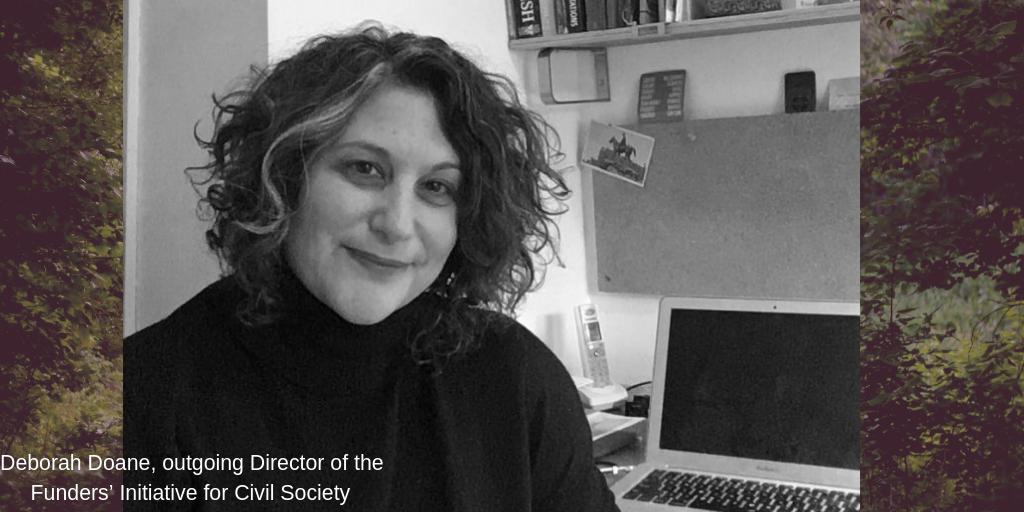 Michael Jarvis, the Director of the Transparency and Accountability Initiative, has suggested we should stop using the frame ‘closing civic space’ because it’s “too all-encompassing” and as a consequence, gets in the way of finding solutions. As the outgoing Director of the Funders’ Initiative for Civil Society (FICS), whose primary purpose is to address closing space, my response to him may be predictable: but I couldn’t disagree with him more.
Michael Jarvis, the Director of the Transparency and Accountability Initiative, has suggested we should stop using the frame ‘closing civic space’ because it’s “too all-encompassing” and as a consequence, gets in the way of finding solutions. As the outgoing Director of the Funders’ Initiative for Civil Society (FICS), whose primary purpose is to address closing space, my response to him may be predictable: but I couldn’t disagree with him more.
I’m going to use a parallel analogy. A close friend has recently been diagnosed with a mental health issue. The broad term ‘mental health’ is, of course, a subset of the wider health system (as civil society space is of democracy), and also captures a range of issues: stress, depression, schizophrenia, bipolar disorder, amongst others – all of which need different treatments for different manifestations.
Not so long ago, certainly in the west, people with severe mental illness were locked up in institutions, or they ended up in jail, or worse, dead.
But for my friend, there is now a system of professionals to help her through it, after years of concerted investment: the police who brought her to safety; the nurses who calmed her down and administered immediate medication; the psychiatrists who work out the best prescription; the longer-term social and psychological workers who will help her manage her condition, not to mention the advocates who shape government policy to get us to this point and beyond.
Underneath all of the work behind the immediate acute care she received lie the researchers, the academics, the journalists, who are shaping more positive narratives of mental health so that it’s nothing to be feared. And many are exploring the root causes of mental health too. Some of them are indeed chemical or genetic, but many of them are also environmental or social, with similar root causes that lead to other problems in society. Depression, for example, is not just a chemical imbalance in the brain – its triggers can also be caused by conditions in modern society, which sees people isolated or facing undue stress or both. Some research shows that the causes may be linked to our physical environment: research from China shows a possible link to air pollution, for example. And these underlying conditions might also be those that cause racism, inequality or even climate change. In other words, they’re systemic. This is part of Michael’s bug-bear with the term ‘closing space.’
Has putting a label on ‘mental health’ hindered finding solutions? No, quite the opposite …it has helped to coalesce diverse professions and provided much-needed attention to the issue. The specific framing around mental health has given us a language to advocate for better policies, to invest in people impacted by it, and, hopefully, in the long run, to see better management or even less prevalence of the multitude of illnesses the term ‘mental health’ encompasses.
Which brings us back to ‘closing civic space’. I was drawn to working on the issue of closing space for the very reason that it drew together so much of my experience of working with civil society in recent years. It put a frame around what groups and individuals I knew in the global south had gone through, and my own experience of being silenced here in the UK as a result of restrictive legislation. It gave me a vocabulary to understand a wider system as a subset of democracy – and enabled many of us, as in the mental health system, to look at both the immediate support systems that were needed, alongside considering the long-term, underlying causes that we need to address.
Mental health awareness and solutions have been decades in the making, whereas the issue of ‘closing civil society space’ or ‘closing civic space’ is only just beginning to emerge. It’s certainly not mainstream outside of human rights and perhaps environmental philanthropy or small groups of civil society activists. We don’t need to stop using the term. In my view, we need to elevate it more into mainstream circles. We need more advocates, and more investment to help bridge those communities who are taking different approaches to either the immediate symptoms of closing civil society space; or tackling the deeper, underlying root causes.
Deborah Doane is the outgoing Director of the Funders’ Initiative Civil Society
First published on Ariadne site
This blog was written by Deborah Doane.


